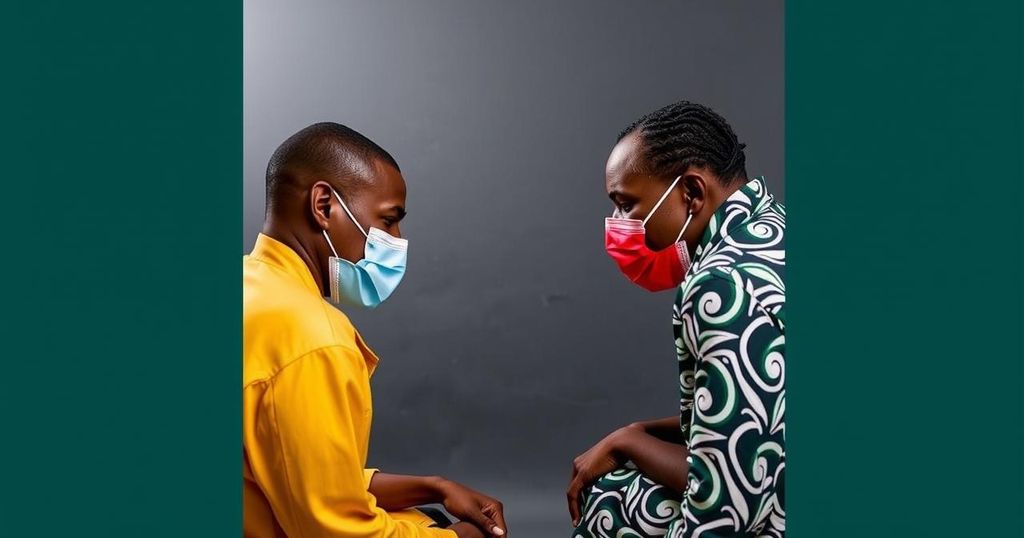Mpox cases in Uganda have reached about 830, primarily affecting adult men, while Rwanda reports four new Marburg cases, raising total infections to 66. Vaccination efforts are underway in both nations amidst these outbreaks, underscoring the urgent need for public health responses to control the spread of these viruses.
The spread of mpox in Uganda has reached a concerning level, with approximately 830 cases identified across 19 states, as reported by the Africa Centres for Disease Control and Prevention (Africa CDC). Originating in Nakasongola Prison, new clusters of infections have emerged near the border with the Democratic Republic of Congo (DRC) and among fishing communities. In the past week alone, 61 new cases and one death have been documented by Dr. Ngashi Ngongo, the mpox lead at Africa CDC. In contrast to the DRC, where children constitute nearly half of the reported cases, only 12.5% of Uganda’s cases affect children, with adult men representing 63% of cases. The dominant strain in Uganda is Clade 1b, which is associated with sexual transmission. In other developments, Mauritius has confirmed its first mpox case, while the UK reported its inaugural Clade 1b case in a traveler returning from an affected region. The continent has seen an increase of 2,766 cases in the past week, primarily concentrated in the DRC and Burundi. Although vaccination campaigns are progressing positively in the DRC and Rwanda, Nigeria has postponed its vaccination efforts. Concurrently, Rwanda has recorded four additional Marburg cases within the last fortnight, including a health worker and three contacts of previous cases, which has raised the total to 66 confirmed cases and 15 fatalities, resulting in a case fatality rate of approximately 23%. The outbreak has been traced to fruit bats residing in a mine near Kigali, which infected the initial case who had visited the mine site. In response, the Sabine Vaccine Institute has dispatched 1,000 investigational vaccines to Rwanda for use in a randomized clinical trial. The updated trial protocol includes immediate vaccination for half of the at-risk individuals and delayed vaccination for the other half, aligning with the disease’s incubation period. Notably, the current vaccine has not yet demonstrated clinical efficacy against the Marburg virus. In conclusion, the escalating incidents of mpox in Uganda, alongside the resurgence of Marburg cases in Rwanda, necessitate a robust public health response and vigilant monitoring of transmission patterns. Vaccination campaigns and research into effective treatments remain crucial as health authorities work to control the outbreaks in both nations.
Mpox, also known as monkeypox, is a viral disease resembling smallpox and is characterized by fever and rash. It has seen a resurgence in certain regions, particularly in Africa, where transmission patterns can vary. The dominant strain can be sexually transmitted and affects different demographics in various geographical locations. Recent cases in Uganda highlight the concerning spread of mpox, particularly in vulnerable communities near borders with affected countries such as the DRC. Similarly, Marburg virus, a highly infectious disease with a significant fatality rate, has prompted urgent health measures in Rwanda following exposure linked to wildlife. Vaccination efforts and monitoring of both mpox and Marburg virus cases are critical in mitigating these public health challenges.
The ongoing outbreaks of mpox in Uganda and Marburg virus in Rwanda highlight the challenges faced by health authorities in controlling infectious diseases in the region. With increasing case numbers and emerging clusters, immediate action, including vaccination campaigns and rigorous public health measures, are essential to protect at-risk populations. Additionally, continued research into effective vaccines and treatments plays a vital role in managing these diseases and preparing for future outbreaks.
Original Source: healthpolicy-watch.news







